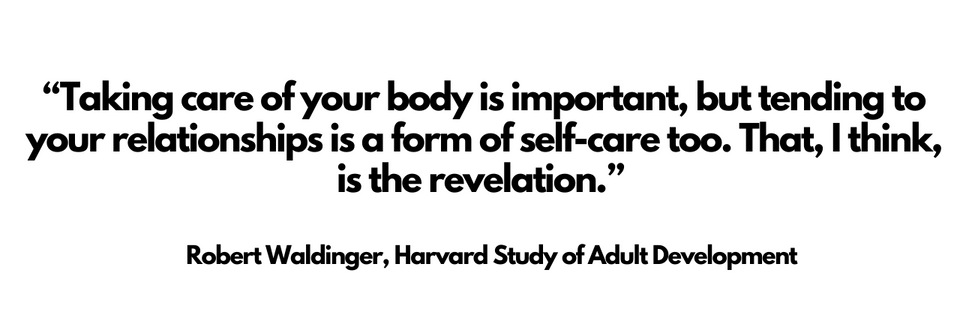Why social wellness is the midlife health superpower
Jun 29, 2022
One of the things that suffered the most during the first part of the pandemic was social networks (and not the online kind). With all the benefits that working from home provided, it also meant that our social outlet at work (and for many, their regular social life) all but disappeared overnight.
Supportive relationships and networks are one of the key determinants of health. In fact, having interpersonal relationships is one of the main ways humans have evolved and endured; as people got older in early civilizations, supportive relationships were vital to their long-term survival.
You might be surprised to know that the importance of social connectedness has stubbornly persisted in our modern life and has one of the most profound impacts on our disease and mortality rates in aging. It's so important that social wellness is its own field of study and has come to the forefront in healthy aging research and policy in the past few decades.
Why is Social Wellness Important?
Typically, preventative health efforts focus on physical behaviours like quitting smoking, eating better, and increasing physical activity, but we now know that far more effort should be spent emphasizing the importance of social support. Having good quality social relationships impacts our mental health, physical health, health behaviours, and overall mortality risk.
A collection of studies have connected low levels of social ties with the development of cardiovascular disease, high blood pressure, cancer, slower healing from injury, and impaired immune function.[1] Simply put, supportive social relationships can help prevent diseases from developing and allow us to recover faster when we are sick.
The numbers regarding the health impacts of social wellness are startling. In an analysis of social health studies, researchers looked at data from 308,849 individuals over an average of 7.5 years.
Those with strong social relationships were 50% more likely to survive during the study period than those with poor-quality relationships. This health effect could be compared with quitting smoking and has a bigger overall impact than other well-known interventions like reducing obesity or increasing physical activity.[2]
One of the most long-running studies of human health and happiness, the Harvard Study of Adult Development, found that poor social connections were more predictive of mortality than was high cholesterol in mid-life. The lead researcher of the Harvard study delivers a really engaging Ted Talk on the research results, which you can watch here.

How does the protective effect of social wellness work? There are two main theories. One idea is that social relationships may provide the overall resources that promote our physiological and psychological responses, which in turn buffer the negative impacts of stressors on health.
The second theory is that your health is improved in more direct ways, like friends providing emotional support, or by the indirect outcomes of your friendships, like when you mimic the healthy behaviours of women in your social group.
We know from current research that both the number and quality of our social connections are decreasing. Social links have declined for many reasons, including changes in family structures, fewer households with different generations of family living together, and increased rates of disabilities as people age.
How you can improve your Social Wellness
I created these tips from my community-based research with older adults, and learning from those who are socially isolated in later life:
1. Be a joiner. In my work, we talk a lot about joiners and non-joiners. Joiners, as you might have already guessed, are those people who join regular group activities. Guess what? The joiners are typically more physically fit, happier, and more connected to their communities.
The non-joiners are usually alone and isolated out of a long-term habit; they never saw the value of being a part of a group and now have significant difficulty joining up when they need groups the most. Become a joiner now.
2. Adopt a friendship mindset: Is there a friend you haven’t seen or connected with in a while? Reach out to that person this week. See if you can reach out to four friends over the next month.
3. Prioritize your social wellness: Keep in mind that your social wellness is as important as getting regular physical activity or eating well. Even if it seems like a lot of effort, make a point to schedule time for your friends every week or at the very least, every month.
4. Take baby steps: Sometimes, it’s easier to spend time with your partner than to go out with friends, but the unfortunate reality is that one day, one of you will no longer be there. Friends provide the much-need support and long-term outlet we can’t get from just one person.
5. Focus on activities that can remain accessible. This may sound strange when you are in middle age and fit, but if you focus your social effort on something that takes, for example, a long drive, when your mobility changes, you could potentially lose this outlet. The number one barrier to social participation as people age is the lack of transportation.
In the end…
We never outgrow the need for our friends. They support us in our darkest times and are there to celebrate in our times of joy. Friendships buffer us against life’s stressors and challenges and truly protect our health. We need to care for those friendships in the same way we care for other treasured things in life.
I encourage you to develop a friendship mindset and see if you can increase your social connectedness or spend time working on nurturing those crucial relationships you already have.
Get Your Free Copy of Managing in Midlife
Discover how to better support, engage, and retain midlife and older women in the workplace. This insightful whitepaper will help you build a more age-inclusive organization—and foster a culture where all generations thrive.
Plus, stay updated with the latest news, blog posts, and insights from Cardea.
We hate SPAM. We will never sell your information, for any reason.

